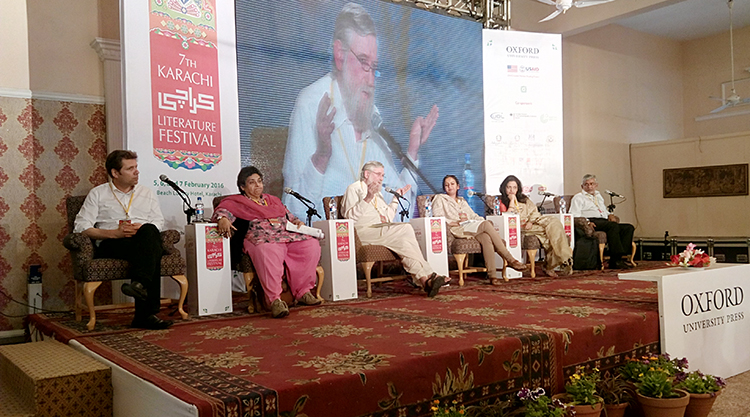KLF Day 3: The White Stripe on the National Flag
作家: Sadeem Shaikh - 发表于: 2016å¹´02月09æ—¥ | ENG (English)

(l-r) - Olivier Truc, Shaheen Attiq-ur-Rahman, John O'Brien, Nazish Brohi, Reema Abbasi & Sono Khangharani
Day III of the Karachi Literature Festival featured a host of riveting talks by some of the leading writers, researchers, social workers, journalists, and photographers from Pakistan and beyond. One of the sessions, titled ‘The White Stripe on the National Flag’, drew particular attention from the Karachi crowd, with large numbers turning up at the Jasmine Hall of the Beach Luxury Hotel. Moderated by Nazish Brohi, a prominent independent researcher in the social sector, the panelists included French journalist Olivier Truc, authors Reema Abbasi and John O’Brien, and development workers Shaheen Attiq-ur-Rahman and Sono Khangharani.
The title of the session in itself hinted at the content of the discussion that was to be shared with the audience. Beginning with a historical take on the story behind the national flag of Pakistan, Brohi left it up to the panelists to jump in and share their views on the current situation of minorities in the country. Using a relevant corollary of the canaries in the coalmine, Brohi explained how the impact of the mistreatment of minorities at the ground level can cause massive ripples in the larger society. This set the perfect tone for the discussion that ensued.
While Truc drew comparisons between the conditions of minorities in Pakistan with those in Europe, Khangharani pointed out the irony of the segregation that they are subjected to on a daily basis in a country that was founded on secular grounds. Despite the fact that minorities have contributed significantly to the economy, they have been isolated at every level of existence, and denied their basic rights to citizenship. Countless policies and bills specific to the state of minorities are unfortunately passed on as words, and nothing more. Khangharani’s efforts to channel his views through a social and economic lens were picked up by Rahman, who stated that everyone in the crowd was responsible for the conditions of minorities in Pakistan. “It is because of people like you and I, who fail to take initiative and remain silent, that minorities find themselves in so much distress today,” said Rahman.
Following up on Rahman’s point about deeply integrated caste systems within minorities, Abbasi explained how minorities such as the Dalits, Christians, Hindus and Sikhs are treated harshly by national institutions such as Nadra. Faced with constant discrimination, many minority groups have fled the country, including those who have contributed significantly to the Pakistani economy. This ‘brain drain’ has wider repercussions that might not feel significant at present, but will surely have an impact in the time to come. O’Brien built on this point by taking on a historical approach, explaining how far we’ve regressed from the time of Partition: the national anthem was written by a Christian, the first Foreign Minister was an Ahmadi, and the founder of the country, Jinnah, was a Shia. It is hard to imagine such diversity in the ruling ranks today. Sectarian in-fighting and the blasphemy law are crude examples of jealously, rivalry and revenge that are being expressed on a dangerously large scale.
Brohi concluded the discussion in an articulate fashion, stating that we all need to re-examine ourselves and our history, aiming to derive future minority-specific solutions by introspectively analyzing our past, present and potential future.


